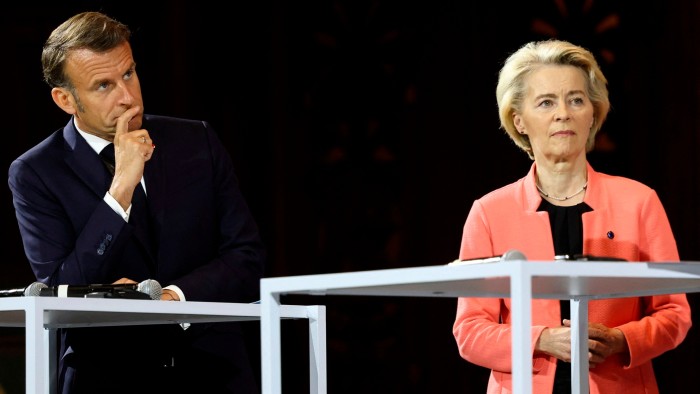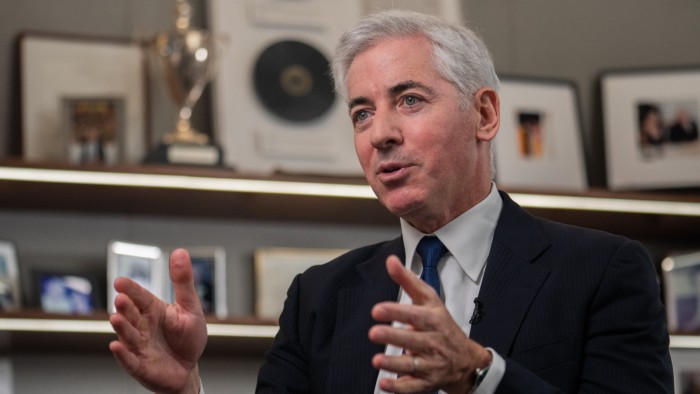Macron says Trump’s academic crackdown threatens US

Unlock the White House Watch newsletter for free
Your guide to what Trump’s second term means for Washington, business and the world
Emmanuel Macron has warned that Donald Trump’s crackdown on US scientific research threatens America’s economy and democracy, as the French leader and European Commission president Ursula von der Leyen made a pitch to researchers to come to Europe instead.
“No one could have thought that the world’s biggest democracy, whose economic model relies so heavily on science, on innovation and on its ability . . . to have disseminated this innovation more widely than its European peers, would make such a mistake. But here we are,” Macron told a conference at Paris’s Sorbonne university on Monday.
“Without free scientific inquiry, we lose . . . pillars of our societies which are the very heart of western liberal democracies, first and foremost of which is our relationship with the truth,” the French president said.
The Trump administration has launched an unprecedented crackdown on universities in the US and is seeking to slash federal funding and suppress research into subjects including vaccination and climate change.
Speaking ahead of Macron at the Sorbonne, von der Leyen proposed a €500mn financial package to be spent in 2025-2027 “to make Europe a magnet for researchers” and to support those who choose to relocate to the continent.
Von der Leyen did not mention the US or Trump by name, but said “open and free” science was Europe’s “calling card”.
“We must do everything we can to uphold it, now more than ever before,” she said. “Europe must remain the home of academic and scientific freedom.”
Macron also promised an additional €100mn for initiatives to attract researchers to France by the end of 2030, though neither he nor von der Leyen gave details of how the funds would be used.
Macron was explicit in his criticism of the US administration as he reiterated his calls for greater scientific sovereignty in Europe.
“We sometimes failed because it was so comfortable to be hand-in-hand with the Americans. Many Europeans had a strong conviction [that] we would never be abandoned. It’s as if they were us, but that’s not true,” he said.
The stand-off between the Trump administration and US universities has alarmed many administrators and researchers as the president has stepped up attacks on American institutions his supporters consider too progressive. The administration has also revoked visas for foreign students and researchers.
In the wake of the Trump crackdown, the UK government is preparing to launch a £50mn scheme to woo international research talent to Britain with research grants and relocation funding, according to people briefed on the plans.
Macron and von der Leyen sought to present a vision of free scientific inquiry, citing the role science played in structuring European society from the Renaissance through the Enlightenment era.
The French president also linked attacks on expertise with the rise of conspiracy theories and misinformation that could fracture societies. He cited the 18th century French philosopher Voltaire to warn that believing in a “revealed” truth and prohibiting research would put at risk society’s “capacity to disagree, together”.
Europe has for decades struggled to compete with the US on research and innovation due to red tape, lower funding and less developed links between academic research institutions and the private sector.
France, in particular, is home to many top scientific universities but many of its graduates have left for bigger opportunities in the US, leaving the continent with a dearth of champions in technologies including cloud computing and AI. European leaders now see an opportunity in the profound changes sweeping through the US system.
“We have to make it easier and more attractive to come to Europe for research,” von der Leyen said, citing the need to speed up entry processes for scientists and researchers and initiatives to link highly skilled immigrants with institutions.
“We are choosing to be the continent where universities are pillars of our societies and our way of life . . . Where global talent is welcomed,” she added. “Progress thrives on freedom, openness and collaboration.”








